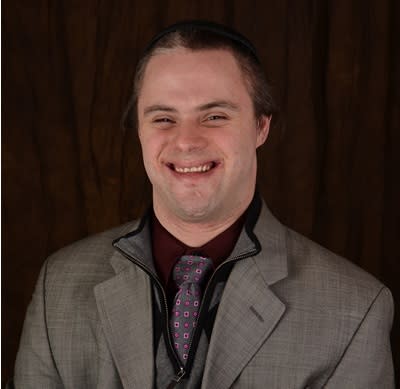On Shabbos Parshas Vayishlach our shul, Congregation Sha’arei Tzedek Mishkan Yair, was privileged to host a CHICAGO YACHAD Shabbaton. Special needs children and teens, together with high school volunteers and college age supervisors spent a Shabbos with the shul, joining us for davening, meals and a special seudah shlishis. I know that the experience touched the hearts of everyone who was there, leading each of us to draw different lessons and experience our own personal reactions. What follows is a few of my own personal reactions, coming from “the rabbi’s” perspective:
An experience like the Yachad Shabaton is highlighted in moments – images that we freeze frame in our minds and words that echo in our ears. I hold the image in my mind of a child with Down’s syndrome eagerly waiting with shining eyes and an angelic smile, for the Aron Kodesh to be opened and for the Sefer Torah to be taken out. As the Torah comes down the stairs, he gingerly touches it and kisses his hand and then leans over and kisses the Torah itself. There is so much love and excitement in the simple display of ahavas haTorah, and I ask myself – what about us? What about me? Do I have that same love? Am I as excited by Torah as he is. Does it really have to be that because we know more, we feel less? Could it be that we are smarter but he is wiser? What can we do to recapture the wisdom of unjaded innocence? This is the challenge posed by that gentle kiss that I witnessed.
Then there are the words that echo. Shlomo Meyers, a young man with Down’s Syndrome, addressed the shul Shabbos morning. In a beautiful dvar Torah he spokee about unity, the importance of mitzvos and learning Torah. Listening to him, we knew that we were hearing words from someone with no agenda but to tell us how he feels. The importance of Torah and Mitzvos was a theme that was voiced by several other Yachad participants at the Friday night seudah and at seudah shlishis. When we hear young people who are so seriously challenged telling us, through their divrei Torah, that learning Torah is so important, how can we can we not walk away promising ourselves that we will finally make that seder or start going to that shiur that we we have been putting off for so long?
And then there are the volunteers. Watching young people committing so much of their own time and energy to helping other young people experience Yiddishkeit and reach heights that they could never do on their own, is to watch how one who gives, receives so much more in return. The mentor seeks to teach and learns so much more, comes to inspire and walks away inspired, lifts up the spirit of another as he himself reaches new heights of sensitivity and caring. What have we done to help someone else lately? What can I do to help someone else tomorrow?
Perhaps the most powerful lesson of all came from seeing the varied backgrounds that the Yachad participants came from. There were chasidish children, yeshivish children and those wearing knitted yarmulkas. And yet, the children themselves were oblivious to those differences. They never learned that people with slightly different hashkafos are not supposed to get along and aren’t supposed to daven together. What do we say to ourselves when we see that these children from such diverse backgrounds can get along and be ‘b’yacahd’? Do we feel sorry for them or do we feel sorry for ourselves? The intolerance that often exists among adults is a disease that we pass on to our children. They learn from us that a hashkafa can only be taught by putting down those that may have a slightly different hashkafa. We define ourselves with evermore narrowing labels, all in order to exclude others from our circle. How often have we heard from people who refuse to daven in this or that shul because it’s too “black”, not “black enough”, to yeshivish, too modern, not Zionist, too Zionist and the list goes on? How sad is it that people feel the need to accentuate the one percent in which we may differ instead of the 99 percent in which we are the same? The Yachad children have not learned to put down others. They are perhaps the only “congregation” that includes members from every single sector of the community, and somehow they all manage to get along with each other. Just maybe, they have something to teach us.
As always, the inspiration is the easy part; to translate that inspiration into action is much more difficult. The Yachad Shabbaton challenges us to be more passionate about learning Torah and doing mitzvos, to reach out and help those who for one reason or another may not be as fortunate as we are and to do a much better job at learning how to deal with our hashkafic differences in ways that do not unnecessarily divide us.
Are we up to the challenge?
These are the personal reflections of Rabbi Reuven Gross, Congregation Sha’arei Tzedek Mishkan Yair, whose synagogue hosted the CHICAGO YACHAD Shabbaton on November 19-21. To learn more about YACHAD/NJCD | Jewish Disabilities Integration & Special Needs Programming please visit our web site at: http://www.njcd.org/
The words of this author reflect his/her own opinions and do not necessarily represent the official position of the Orthodox Union.
